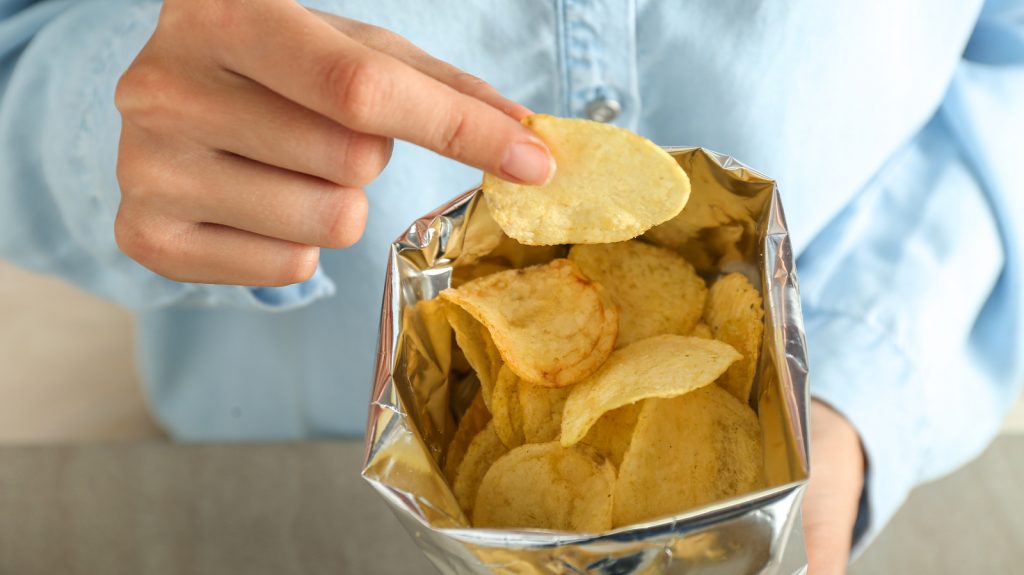When giving attention to brain health, there are certain things you can do to help slow down cognitive decline and boost your brain power. These include exercising and changing your diet to watch what you eat and drink. And although your brain will still age, along with the rest of your body, particular habits can help delay that process.
“While ageing is inevitable, certain eating habits can help fight the effects of ageing or potentially accelerate it,” says Lisa Moskovitz, RD, CDN, author of The Core 3 Healthy Eating Plan. “Generally, it’s important to eat a nutrient-dense, anti-inflammatory, and antioxidant-rich diet to keep your mind and body strong.”
Lisa also suggests that on the flip side, mindlessly snacking on ultra-processed and empty-calorie foods such as candy, soft drinks, and chips may accelerate brain ageing. If you want to avoid some extra cognitive damage, take a look at these four snacking habits that may be ageing your brain faster.
1. Consuming too much-added sugar.

While sugary snacks are an easy midday snack to munch on and may satisfy your sweet tooth, for the time being, they don’t have many benefits to them. In fact, they may negatively affect your overall health, which may lead to problems with your brain health.
“Added sugar found in snacks such as baked goods, ice cream, candy, certain cereals, and bars, can increase blood sugar levels,” says Moskovitz. “Chronically high blood sugar levels can affect your brain’s functional connectivity which, over time, can potentially contribute to brain shrinkage and atrophy.”
2. Eating chips straight from a jumbo bag.

People love to pick up a family-sized bag of chips at the store. Snacking on the chips straight from the bag is also easy. But it turns out doing this has a more severe impact on your age than you might’ve thought.
“Lots of research shows that we tend to eat more when we eat from an oversized bag,” says Lisa R. Young, PhD, RDN, author of Finally Full, Finally Slim and The Portion Teller Plan. “Take a portion, put it on a plate, sit down, and enjoy it! And if you don’t like the taste, choose something else.”
According to a study published in the American Academy of Neurology, research showed that overeating may double the risk of memory loss. If you eat too many calories repeatedly, over time it may actually raise your chances of developing memory loss or mild cognitive impairment later in life.
3. Drinking liquid calories.

Liquid calories are drinks that don’t bring much to the table besides unnecessary calories. These include soda, juice, and sweetened iced tea. And although they may seem harmless as a midday treat, they can lead to cognitive problems.
In a study published in the journal Stroke, participants who drank at least one artificially sweetened drink per day were three times as likely to develop stroke and almost three times as likely to develop Alzheimer’s disease.
“These [liquid calorie drinks] are high in sugar and contain unnecessary calories,” says Dr Young.
Eating large amounts of processed foods.
Similarly, eating any kind of processed food in high amounts will have a negative impact on your brain health.
“When consumed in large quantities, snacks such as chips, baked goods, and candy bars, with high amounts of saturated fat and/or refined flours can increase systemic inflammation,” says Moskovitz. “Eventually, this may contribute to cognitive decline and memory loss.”




![The Top & Most Popular Seafood Bucket Restaurants in Dubai for you [Never Miss]](https://uae24x7.com/wp-content/uploads/2020/09/8-seafood-in-a-bucket-scaled-e1600739237403.jpg)
![Procedures for Renewing the Driving License in Abu Dhabi [3 Simple Steps]](https://uae24x7.com/wp-content/uploads/2020/07/Capture-9-e1595666454466.jpg)





